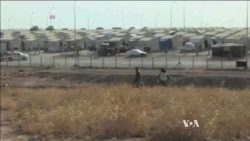The depredations of the Islamic State group in Syria and Iraq against monuments, archaeological treasures and thousands of innocent people have drawn outrage from around the world. No group has suffered more than the religious minority known as Yazidis, thousands of whom continue to live in U.N. refugee camps as Kurdish forces fight jihadists in northern Iraq.
An American graduate student at the University of Chicago who spent time with Yazidis has become a champion of their cause. In a Skype interview, Mathew Barber spoke of how Yazidis felt betrayed when IS invaded Sinjar, in Iraqi Kurdistan, last year.
“The Kurdish forces, the Peshmerga, that were responsible for defending Sinjar — they fled before the jihadists reached the area. So the Yazidis were left vulnerable," Barber said. "They were abandoned by the forces of the government that claims to protect them.”
Barber said widespread prejudice against Yazidis has not stopped many Kurdish Muslims from displaying goodwill.
“When the displaced Yazidis were fleeing into the city of Dohuk, there were many people, neighbors there, who were coming out to their communities, bringing food, supplies, clothing," he said. "These were Muslims coming to visit Yazidis. I saw Muslim religious leaders coming out and pledging their support.”
Kurdistan’s government has pledged to avenge the Yazidis and has deployed troops to drive IS out of occupied areas.
Many Yazidis say they would like to leave Iraq and live in Europe or the United States, but Barber said this would mean "the disappearance of an important element of the diversity of the region.”
Yazidi immigrants in the United States and elsewhere are trying to build communities and preserve traditions, but Barber said they leave important things behind.
“The Yazidis have traditional holy places and shrines, and if they leave the region and migrate out of Iraq, it does irreparable damage to their tradition,” he said.
Immigrant Yazidis in Houston and elsewhere say they are doing what they can to preserve their traditions, but their main concern now is preserving the lives of people back in their homeland.





